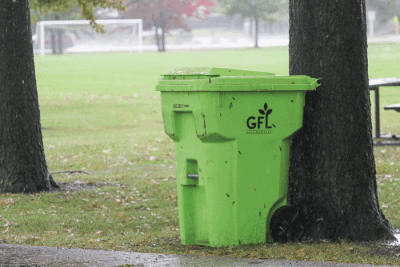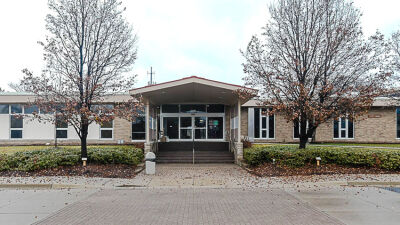
The city of Madison Heights is moving ahead with plans to provide trash carts and recycling carts to each household next year, funded in part by grants.
Photo by Patricia O’Blenes
MADISON HEIGHTS — To help reduce the rat population, the city of Madison Heights will spend more than $500,000 to provide each home with trash and recycling carts.
Staff members are currently working out the details, such as exploring a possible rebate program for those who already have carts. The City Council approved the trash and recycling cart rollout at its Sept. 26 meeting by a vote of 6-1. Mayor Pro Tem Mark Bliss was the sole holdout, citing concern for residents who already bought carts, and other possible uses for a half-million dollars.
The council accepted two grant awards: a $403,200 materials management grant from the Michigan Department of Environment, Great Lakes, and Energy; and a $105,600 grant from Recycling Partnership, a nonprofit group that assists cities in implementing recycling programs.
The city learned it received the EGLE grant Aug. 30. There were two stipulations: The city must offer a 20% match for the grant, and the city must complete a universal rollout. The council authorized the city manager to sign the grant agreement on behalf of the city.
As part of the same vote, the council also approved the allocation of $540,000 to the budget for fiscal year 2024-25. This will cover the cost of purchasing, assembling and delivering 19,200 carts to 9,600 households, with one trash cart and one recycling cart per household.
The grant from Recycling Partnership was received in June 2023, with no stipulations, and will cover the 20% match for the EGLE grant, as well as infographic sheets with best practices that will be affixed to each cart.
The trash carts will be 96 gallons each, while the recycling carts will be 64 gallons. Both will have wheels and a secured lid. The colors are yet to be determined.
The grant required the city to purchase the full allotment of carts. If any residents decline to accept them, the city will retain them as extras for the future.
In total, between the city’s share and grants, the program costs $1.03 million. The city’s half will be paid out of the general fund. The program’s rollout will begin in the summer. The city is beginning to develop an opt-out program for those who have already purchased carts.
Bliss, the sole vote against the carts, said he was concerned whether the program was fair to those who had already purchased their own, as residents have done now for decades.
“First, I do appreciate the benefit these carts will bring to our residents. I don’t discount that it will lead to a significant reduction in rats. And I know carts are something other cities have provided for years. But for me, there weren’t enough details ready to review,” Bliss said. “What do we do for those who have already spent money buying carts? Do they get a second cart? Are we going to offer a rebate? Are they just screwed because they paid for their own carts? We have thousands of residents who already bought their own carts. We gave them no notice we’re buying, and there are still people buying carts. So I feel like we should’ve done more to promote this discussion.”
He also spoke to other possible uses for a half-million dollars.
“I view every dollar we spend at the city level through the same lens as what I would do with my personal budget. Every dollar matters. And when you’re talking about a half-million dollars, discussing alternatives is especially important,” Bliss said. “We’re not just talking about a potential playscape, or equipment for police and fire. We could also be talking about reducing the water rate or reducing our taxes — things like that, which residents may prefer over getting these carts.”
During the meeting, Melissa Marsh, the city manager, said that the council had limited time to make a decision.
“Now is the time (to consider it), since we do have this grant paying half the money,” she said. “I know there have been quite a few people who have already bought these, and they may not think it’s 100% fair, but this is an opportunity to roll out this program.”
Councilwoman Emily Rohrbach made the motion to approve the carts.
“This is a great way to encourage recycling, to encourage our residents to participate in that,” she said. “One of the things we hear a lot is that there are rats, right? And one of the things with the rat problem is that a human behavioral problem will often cause rats … because we don’t always put our trash away (correctly), or we don’t always do things that would prevent a hospitable environment for rats to grow. Having closed and contained trash and recycling bins makes a big difference for that.
“So I am really excited about this, and I think our residents will see an improvement,” she said. “I personally have already bought carts, so I won’t benefit personally. But I am really glad that (other) residents will benefit from them.”
Mayor Roslyn Grafstein agreed it’s a good idea.
“I myself bought a recycling toter in 2020 and don’t (have a) need for a larger garbage receptacle. However, these toters are sturdy and rodent-proof, so I am in favor of taking advantage of this opportunity now to purchase them for everyone,” Grafstein said via email. “Many of our residents put garbage out in bags or in cans that have holes, making them attractive for rats and other critters. These new toters will discourage rodents and better control odors. They also come with a 10-year warranty so that if they are damaged, they can be replaced at no additional cost.”
 Publication select ▼
Publication select ▼


























